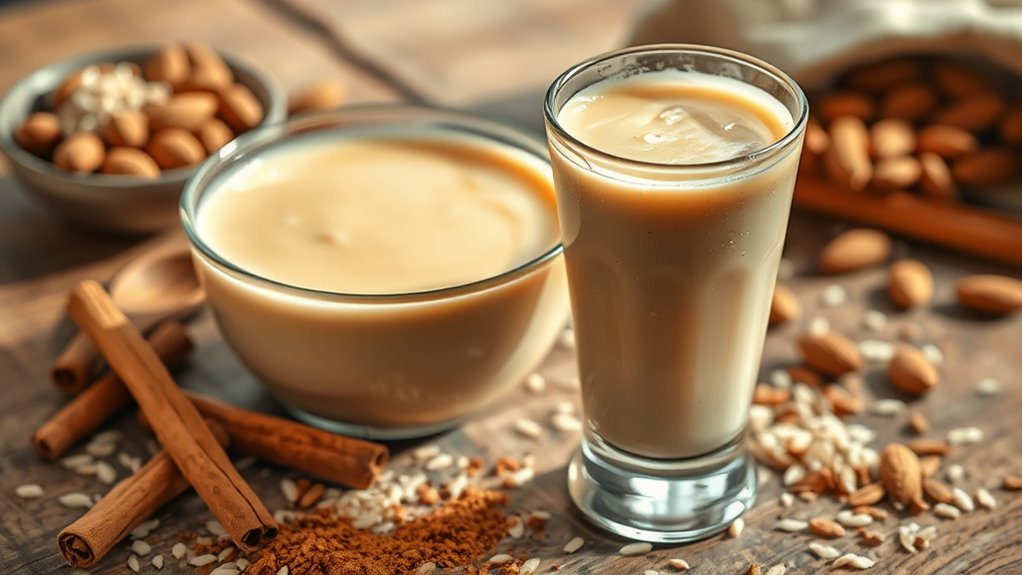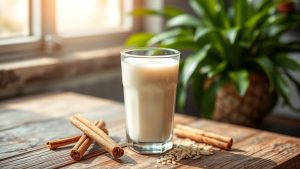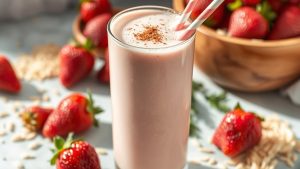
When you consider horchata, remember it's mainly made from rice, milk, and cinnamon. This means it's high in carbohydrates—about 85%—but low in fat and protein. Each cup can contain around 21 grams of sugars, which may impact blood sugar levels. With about 87.3% water, horchata helps with hydration, though it's relatively low in essential vitamins and minerals. Understanding these key nutritional facts can be crucial for your diet. Let's explore further details on horchata's composition.
Horchata, a revitalizing beverage rooted in Latin American culture, boasts a unique nutritional profile that varies depending on its ingredients. Typically, you'll find horchata made from rice, milk, cinnamon, and sometimes vanilla. These ingredients contribute to its distinct taste and nutritional content.
When you look at the calorie count, it can range from 55 to 130 calories per 100 grams, making it a relatively low-calorie option when compared to many other sugary beverages.
Carbohydrates make up a considerable portion of horchata, often around 85%, primarily sourced from the rice and milk. This high carbohydrate content means you're getting a quick energy source, which can be beneficial if you lead an active lifestyle. However, you should also be aware that a cup of horchata can contain about 21 grams of sugars, often derived from added sweeteners or the natural sugars in milk. This high sugar content can raise concerns, particularly if you're managing diabetes or watching your weight.
Horchata is generally low in fat, averaging around 12% of its total composition. If you're looking for a beverage with minimal fat, horchata fits the bill. However, it's worth noting that its protein content is relatively low, usually around 4% or less. So, if you're aiming to increase your protein intake, horchata may not be the best choice. Additionally, horchata contains micronutrients like thiamin and copper that support energy metabolism.
Another point to reflect on is the micronutrient contribution of horchata. While it contains small amounts of calcium, phosphorus, and potassium, it falls short in providing the essential vitamins and minerals you might need. The beverage is approximately 87.3% water, which makes it a good option for hydration. It can help you meet your daily fluid intake, especially on hot days or after exercise.
The nutritional values of horchata can vary considerably based on the specific recipe or commercial version you consume. For instance, some variations may include additional sweeteners or flavorings that can alter the sugar and calorie content. If you're opting for store-bought versions, be sure to read the labels, as these products often have different nutritional profiles due to added ingredients.
Nutritional values of horchata vary widely; always check labels for added sweeteners and ingredients.
When you compare horchata to other beverages, it generally has a higher carbohydrate content and lower fat compared to fruit juices, yet it has less protein than dairy or plant-based protein drinks.
While it offers hydration and energy benefits, you should be cautious about the potential health risks associated with its high sugar content. Excessive consumption can lead to health issues, particularly if you have existing dietary restrictions or allergies related to dairy or gluten.
Conclusion
In conclusion, horchata is a delightful treat that not only pleases your palate but also offers some nutritional benefits. While it's tempting to indulge, being mindful of its sugar content and calories can help you savor it without any worries. With its blend of rice, almonds, and cinnamon, horchata brings a comforting, creamy experience that can enhance your overall well-being when enjoyed in moderation. So go ahead, indulge, but remember to balance it with wholesome choices!



